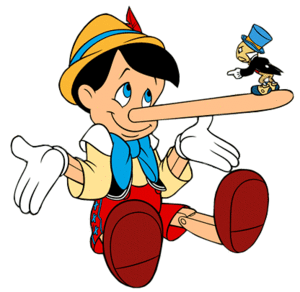Jamie Whyte has a guest-post on Steve Landsburg’s blog arguing that we should force politicians to put their own money on the line when they make prognostications. E.g. we should have forced Tony Blair (Whyte is British) to place a bet, using his own money, on whether Saddam Hussein had WMD.
This certainly is a good idea, and it applies not only to politicians but to other blowhards as well.
In making his argument, Whyte defines “lying” as misrepresenting one’s degree of certainty about a factual claim:
Lying is not a matter of saying something you do not really believe. This is because, on matters subject to doubt, we believe “both sides of the debate”. For example, I believe that Osama Bin Laden is dead. But I am not certain of it. Or, in other words, I believe, to a small degree, that Bin Laden is alive. So, if I said “Bin Laden Lives!”, though I would be lying, this would not be because I do not believe it; I do believe it a little. I would be lying because I believe it with less confidence than my assertion suggests.
Once you see lying as misrepresenting your degree of belief, it is clear that politicians lie incessantly. They pretend to a level of confidence that they cannot really feel. Forcing them to bet material sums of money on their claims would encourage them to reveal their true confidence.
Whyte is playing with semantics here a little bit (“I believe, to a small degree, that Bin Laden is alive” is just an unconventional way of using the word “believe.”) But the substance of his argument is that you are lying any time you misrepresent your degree of certainty, not just when you say that you know something, when in fact you believe it is not true. Again, this argument is just about the definition of a word (“lying”) but it raises the question, why are we so quick to condemn those who say “I believe X” when in fact they do not believe X (“these people are liars!”) whereas we are not nearly as quick to condemn those who say “I know X” when in fact they merely believe X, with considerably less than 100% certainty.
It seems clear that it can be just as dangerous for someone to say “I know X” when really he is only 70% certainty of X, as for him to say “I believe X” when really he is 60% certain that X is not true.
This boils down to our gravitation towards incorporating the 50% threshold when defining words. We generally define lying as representing our certainty as being on one side of this threshold, when in reality it is on the other side of the threshold (this is a rough definition). Why don’t we instead define lying to refer to cases where our professed level of certainty differs from our actual level of certainty by, say, 10%? Probably because we hardly ever force people to actually indicate their level of certainty (as as percentage) about anything in the first place.


Pingback: This is what lying is (according to Whyte) | Rousing the Hobgoblins
Pingback: Getting your money back | Questions about Politics, Philosophy, and Math